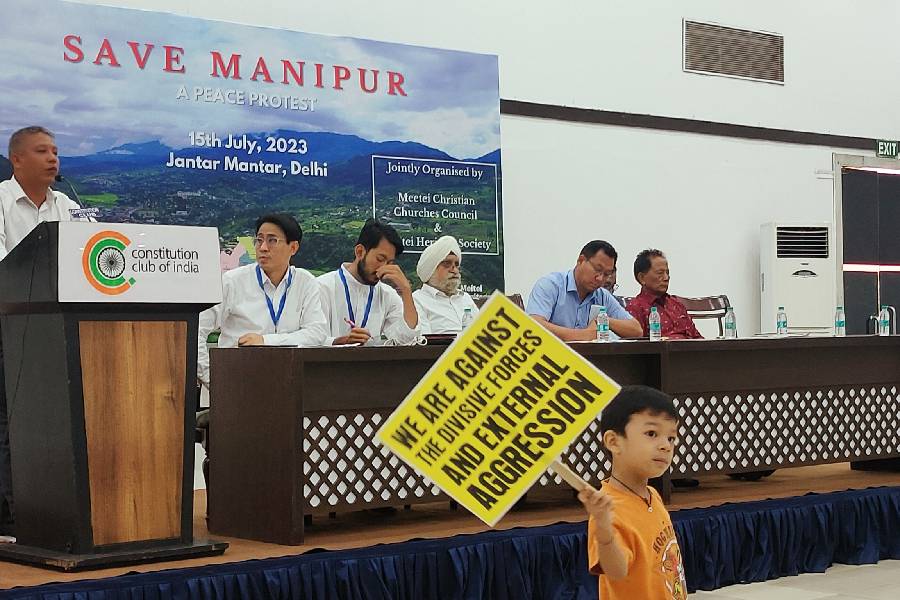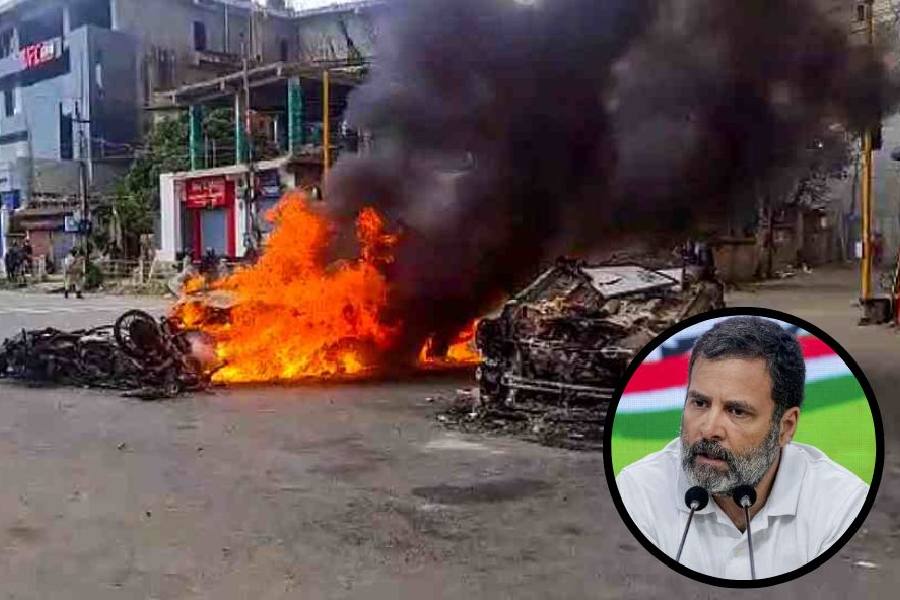Philem Rohan Singh, known for his bicycle and motorcycle expeditions across India for numerous social causes since 2018, has one question.
“Why am I called Judas Iscariot?”
Singh is a Meitei who lives in Imphal. He is also a member of the Ministry of Reconciliation — an independent Church.
On his bicycle earlier, and on his electric motorcycle now, he has been flying two flags: the Indian Tricolour and the Salai Taret, which represents the seven clans of the ancient Kangleipak, the old name for Manipur.
At least 142 people have been killed and more than 60,000 have been displaced in clashes between the mostly Christian Kuki tribals and the largely Hindu Meiteis since May 3. Pro-Meitei groups have flown the Salai Taret as their banner during these clashes.
Singh’s co-religionists from the Kuki community, he says, now liken him to Christ’s disciple Judas who betrayed him to the Jewish clergy.
The slur is testimony to how deep and complex the faultlines in Manipur are.
“For the charity work I have done, Kukis have contributed lakhs of rupees. I have also given humanitarian assistance to Kuki refugees from Myanmar,” Rohan said.
“Two years ago in Moreh, a large number of refugees arrived in a very bad state fleeing the war in Myanmar. I rushed there with milk and other supplies. Some civil society groups in Manipur were angry with me for that. Today, I am being called ‘Judas’ because I am also questioning the attacks by Kukis on Meiteis in the hills.”
Members of the Meitei Christian community, whom Rohan calls a “minority in a minority”, staged a “peace protest” meeting in Delhi on Saturday to highlight their plight.
Police debarred this event, as well as a protest by the CPI-backed National Federation of Indian Women against the prosecution of activists in Manipur, from the protest plaza on Jantar Mantar Road.
The Meetei Christian Churches Forum, Manipur, and the Meitei Heritage Society were able to book the Constitution Club at the eleventh hour.
Pastor Nabachandra Maibram of Kuki-dominated Churachandpur was visiting his daughter in Bangalore when the clashes began on May 3, after a protest by tribal groups against a Manipur High Court order deemed favourable to Meiteis’ demand for Scheduled Tribe status.
Maibram’s home and those of around 127 Meiteis from his congregation have been burnt down, and his sons now live with their families in relief camps in the Meitei-dominated Imphal valley.
Maibram had come to Churachandpur as a teacher in 1976 from Moirang and become a preacher in 1984.
“Mobs came to our home on the intervening night of May 3 and 4. My sons andtheir families fled to the mini-secretariat, which became a camp,” Maibram told this newspaper.
“Four days later, security forces took them to relief camps in Moirang and Imphal,” Maibram said.
His sons, both graduates, are restarting their lives from scratch. One of them ran a grocery store that has also been burnt down. The other is a mason who also plied an auto.
“Last week, my grandchildren began going to a school near the relief camp. Many from my congregation wander from camp to camp looking for loved ones they have lost,” Maibram said. “I have not spoken to the others (Kukis) in my congregation. I was told that they could get in trouble with their community for talking to me. Perhaps they could not help my sons because the mobs came so suddenly at night.”
Maibram added: “Thankfully, in Bangalore, relations between Manipuris are good. Our grocer is Kuki.… We have to accept and love each other, otherwise we will never live in peace. The government can send security forces but we can’t live together unless we learn to love one another again.”
Pastor Dinesh Soubam preaches at the House of Intimacy church in Imphal. He hasn’t delivered a sermon since the clashes began. “Our church was on rented premises. It was not destroyed, but we were asked not to use it any more or we would be at risk. Our congregation, who are Meiteis, are in terror,” Soubam said.
“Mobs have been misguided against churches. One of our members had to shift for a month to Thoubal as he felt unsafe in his neighbourhood.”
He added: “I request people not to be misled. Religion has nothing to do with this clash. We want peace in the future for the church to be secure to conduct proper services and worship freely. The rally of the Interfaith Forum for Peace and Harmony on July 11 in Imphal gave us hope.”
Visiting MPs from Kerala and Tamil Nadu took part in the march.
Rohan said: “If we talk about the mistakes our Meitei brothers have made, they say, ‘Don’t break our unity’. If we talk about what our Kuki brothers have done to us, they ask me if I am a true Christian. Am I Judas?”












